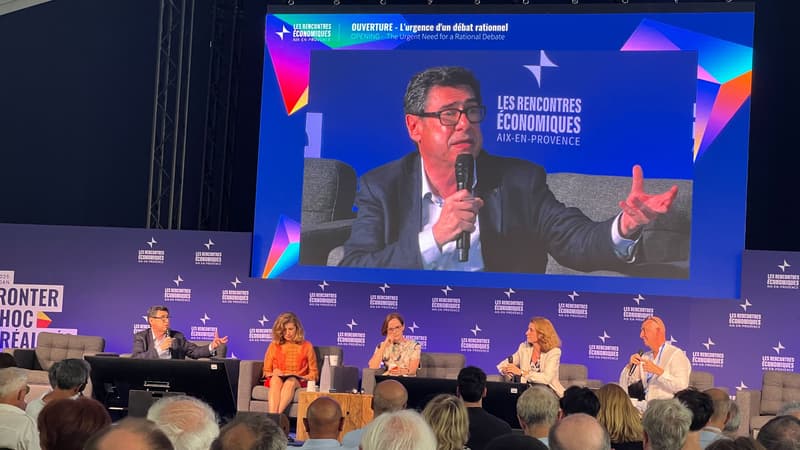Very little fresh air under the heat wave Aix. The economic meetings of Aix-en-Provence that meet as every year the global gratina of economists, great bosses and experts opened this Thursday, July 3 in a lead climate. Among the victory of populisms worldwide, the rejection of rationality and political consensus that is not found (and not in France), mood is not in good shape.
And it was the economist Philippe Aghion who took out the first salvations. “Rocked in the rejection of rationality, the rejection of knowledge, the emergence of nationalism, was launched in the preamble to its intervention in the amphitheater number 1. We launched aboard of Ricardo and Adam Smith. We only think that two countries can win in a commercial relationship …”
In particular, he quotes the example of robot tax projects: “It is absurd, companies that adopt robots become more productive and create jobs.” Or the limits of rentals: “In the short term it is good, but in the end we reduce the supply of homes and people who adhere to their apartment.”
US debt flying and Europe is degraded
Let’s continue with a debate on explosive global debt. This time he is an American who speaks. And this, while Donald Trump is preparing to approve his very controversial “big and beautiful law.”
“The world is addicted to debt and the United States even more, is alarmed by Douglas Rediker, an economist of the Treek Brookings Institute. The ‘Big Beautiful Bill” will increase the deficit of 3,300 billion dollars. That is reality. But rulers use magical thinking and everyone decides to go to sleep. “
Well and Europe in all this? We talk about that at the next round table. The speakers: Jacques Aschenbroich, president of Orange, and Jacques-Philippe Gunther, business lawyer of Latham & Watkins. “The issue of days is the shock of realities and well, let’s start the president of the telecommunications giant. The weight of Europe in the wealth of the world was 29% in 1980 and the United States 26%. Today the United States is still in 26% and Europe has lost more than 10 points and fell to 18%.”
Lack of work, productivity in a mast medium, savings that it lets invest in another place (on the other side of the Atlantic mainly) and especially the European institutions that do not take the measure of the situation, on the contrary: Jacques-Philippe Gunther speaks of “suicide of the European industry” with a commission too privileged by the expense of the creation of the large industrial groups.
“Since 1990, the Commission has rejected about forty fusion or acquisition decisions. But even when they are authorized, it translates into provisions of assets, divestments and, ultimately, industrial breakage. And assets are also redeemed by Americans or Chinese.”
Jacques Aschenbroich recalls in this regard that the United States only has three mobile operators against 4 in France and 120 throughout Europe.
“Experts speak in figures, but people need emotion.”
After Europe, France? It is certainly where you have to look for optimism. “I am uncomfortably pessimistic, shower from the beginning with the help of economist Patrick Artus. In France, I do not see that we can generate a political consensus around a deep reform of the State. Less public spending, more investment in the educational system, seems very difficult.
The economist still cites some encouraging examples such as those of Finland that muscular their education to the point that their students have a great dragee for those of Southeast Asia. O Sweden, which has managed to reduce its public spending by 20 points of GDP from its crisis of the late 90s, while improving the efficiency of its public services.
Policies carried out in a certain consensus within the population. A challenge today in more polarized societies than ever and in which elites are considered suspicious and their demonized solutions.
How to find the path of rationality, the general issue of these economic meetings of Aix-en-Provence? It is the immunology researcher Yasmine Belkaid, who runs the Pasteur Institute, who can have a beginning.
“It must share research and, in general, more clearly and more emotional knowledge, he says. Experts, scientists speak in numbers, in figures, but people need emotion. We need everyone better and emotional.” And not necessarily with negative emotions.
Source: BFM TV


